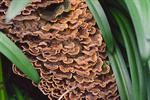Study Phytopathology - improve your understanding of plant diseases and how to control them
 Learn to grow healthy plants.
Learn to grow healthy plants.- Develop your understanding of all types of plant diseases (fungal, viral, bacterial, non-infectious), their life cycles, and ways they can be controlled both with and without chemicals.
- A must for horticulturalists who want to boost plant health and prevent damage by pests and diseases.
Plant production is reduced significantly every year, due to pathological problems. To control these problems is to increase productivity, and for the horticultural business; that means increased profit margins.
What is Plant Pathology (or Phytopathology)?
Plant Pathology is not simply a study of pests and diseases. Some pests are in fact not pathological problems, and there are pathological problems which are not pests or diseases.
Plant Pathology is about problems in plants caused by physiological damage or irritation at a cellular level (ie. it is concerned with problems which affect parts of the plant cell, leading to malfunctions in the normal processes which occur within the plant).
Plant Pathology incorporates knowledge from a wide range of horticultural and science areas, including botany, crops, soil science, biochemistry, and biology.
Course Structure
There are eight lessons in this course, each one taking around 12 hours to complete. There are three main sections to the course:
1. Introduction
2. Types of Diseases
3. The Life-cycle of a Disease
4. Control Techniques
5. Selected Pathogen Diseases - Ornamentals
6. Selected Pathogen Diseases - Crops
7. Non-Infectious Diseases
8. Special Project
Course Aims
- Describe a range of pathological problems that affect plants.
- Describe symptoms of a range of diseases that affect plants.
- Describe disease life cycles and explain how this knowledge can be applied in disease control
- Explain the methods used to control diseases
- Demonstrate a comprehensive knowledge of a particular plant pathogen.
- Identify and describe a range of non-infectious diseases and problems that affect plants
- Identify and describe a range of common pathogens that affect ornamental plants.
- Identify and describe a range of common pathogens that affect crop plants
A Systematic Approach to Learning
1. The first part of the course develops an understanding of the different types of problems which can occur and how to identify them.
Terminology is covered in some depth, so as to enable the student to be able to read and understand books and articles written about plant diseases. Other major topics of study include "symptoms" (i.e. necroses, hypoplases, hyperplases, etc.), "types of pathogens" (i.e. viruses, bacteria, fungi, nematodes, etc), and the life-cycle of a disease.
2. The second part of the course looks at how to control pathology problems. The major methods of controlling pathogens (i.e. sanitation, resistant varieties, biological controls, soil drenches and chemical sprays, etc.) are all studied, along with types of equipment and safety.
3. The third part of the course looks at some of the most common plant pathology problems in commercial horticulture, how to identify them and how they are controlled.
Some of the problems studied include cinnamon fungus, tree decay, powdery mildew, nematodes, brown rot, blights, turf fungi, damping off and non infectious problems such as temperature burns, air pollution, wind burn and excessive light.
Although you study by distance learning the course is a highly practical one, involving as much time in practical/field work as it does theory.
No prior formal training is required, though anyone undertaking this course is expected to have some experience in horticulture (either having worked in the industry or having studied in some related discipline).
STUDENT COMMENT:
"I really appreciate Gavin's (tutor) comments, and look forward to receiving the feedback from him."
Nadine
What This Course Could Do For You
This course will provide a wealth of valuable knowledge for anyone who works with plants. Those of you who do will recognise how widespread and devastating a disease outbreak can be, and know the frustration it can bring after months of nurturing plants. This course goes into great depth about disease life cycles and groups of diseases. It will equip students with a better idea of diagnosis and treatment. The course is aimed at those working in, or wishing to work in, the following fields:
- Horticulture research
- Horticulture science
- Horticulture consultation
- Agronomy
- Crops
- Parks and gardens
- Botanic gardens
- Teaching
Understand more about identifying and managing plant diseases
You can enrol on the Plant Pathology course at any time - students are supported and guided in their studies by our highly knowledgeable, expert Horticulture tutors.
If you have any questions, or want to know more about the course - get in touch with our Horticulture tutors today - they will be pleased to help you.